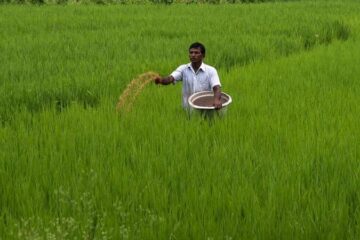An article in Thursday’s Washington Post by Craig Timberg claimed that “the rise of a market mentality” has contributed to the famine in Niger. As you would expect, this has provoked a strong reaction from free market bloggers, such as Don Boudreaux at Cafe Hayek, Melana Zyla Vickers at TechCentralStation, Craig Newmark at Newmark’s Door, and Anthony Batty at The Globalisation Institute, who claim that the problem has been caused by price controls, excessive government regulation and the unintended consequence of well-meaning donor intervention.
In this polarised debate, both ideological extremes are wrong. This is a reality-based blog, so here is the middle ground.
First, Timberg’s claim that market liberalization has led to this famine is painfully misguided. He says:
“In a country adopting free market policies, the suffering caused by a poor harvest has been dramatically compounded by a surge in food prices and, many people here suspect, profiteering by a burgeoning community of traders, who in recent years have been freed from government price controls and other mechanisms that once balanced market forces.”
This does not make sense. Surely he cannot believe that food production would be higher, and more food would be available in Niger, if food prices were lower, for example as a result of Government price controls. Rising food prices create incentives for higher production, marketing of stockpiled food, reduced exports and increased imports. If Niger has too little food, then an increase in food prices is exactly what is needed to increase the supply.
Timberg offered himself up as a free hit for the right wing commentators, which they duly took. But seeing the world through ideological blinkers, they headed off over the reality horizon in the opposite direction.
Notably, Melana Zyla Vickers misunderstands Amartya Sen’s Poverty and Famines, claiming that Sen finds that “command-controlled, totalitarian and authoritarian regimes have regularly bred famine”. Actually, this wasn’t Sen’s point. His analysis showed that some (but not all) famines are caused not by a lack of food production, but by a failure of entitlement, which occurs when some members of the population lack the resources to buy the food they need. It is true that Sen pointed out that excessive state interference might contribute to the failure of the market to ensure that food reaches people who need it. But his central conclusion, which Ms Vickers conveniently ignores, was that even in free markets with sufficient food production, it is possible that an imbalance in the distribution of economic resources might lead to hunger and famine. Sen pointed out that in these circumstances, the best approach might be for aid donors to make cash grants to those who need food, to enable them to buy it in markets and so feed themselves while increasing incentives for the production and distribution of food. So on Sen’s analysis, the conclusion is that rich countries should provide increased resources for Niger, provided in the form of unhypothecated cash grants to the poor (basically, dropping dollar bills out of a helicopter). But of course Ms Vickers (and the corporate interests that fund TechCentralStation) are ideologically opposed to government assistance, and would prefer any US aid that does sneak under the radar to be tied to US corporate interests such as agribusiness, so this wasn’t the conclusion that Ms Vickers reached. She prefers instead to blame the
“failure of the socialist-style economic players — within Niger and around it — to allow its people feed themselves.”
So to be clear: Timberg is wrong that a move to less regulated markets has reduced food production; but Ms Vickers is wrong that food shortages are the result of excessive government regulation and intervention. (Incidentally, Ms Vickers also makes the bizarre claim that most of the population in sub-Saharan African “lives under command-controlled economic conditions” – which is complete balderdash.)
Café Hayek also has a crack at the donors:
“Perhaps if the U.N. weren’t in Niger, traders would be selling food directly to starving people rather than waiting for well-meaning westerners to buy it.”
It would be right to criticize the UN and other donors to the extent that they are importing surplus food from western countries and dumping it in Africa, so driving Africa’s own food producers out of business. We don’t have the figures yet, but I have no doubt that some of this is going on, and it is a scandal. But using aid funds to buy food locally, which is what Café Hayek criticises, is exactly what the donor should be doing, as it supports local food producers and increases production. Café Hayek’s idea that increasing the demand for locally-produced food is likely to result in a restriction on the production and supply for food in Niger is just as absurd as Timberg’s converse ideological argument that lack of food production is caused by higher prices. (I am not saying that it is logically impossible; just that it is highly unlikely and an allegation made with no evidence whatsoever.)
Craig Newmark (the economist, not the geek who runs Craig’s List) is closer to the truth. He is right to dismss Timberg’s claim. But he too ignores the point that even in free, otherwise well-functioning markets, famines can occur when some people are too poor to buy the food they need.
Overall, this was dismal reporting by Timberg which should never have got through quality control at the Washington Post (why didn’t someone like Sebastian Mallaby spike this before it reached the paper?). But the ideologically-driven outpourings of the right wing bloggers were no closer to reality. The problem here is not market regulation or aid, but poverty, and that is something that we can and should do something about.



7 Comments
Sam · August 13, 2005 at 5:16 pm
“Anthony Batty [and others] claim that the problem has been caused by price controls, excessive government regulation and the unintended consequence of well-meaning donor intervention.”
Actually Anthony does no such thing. He merely says that price controls would make matters worse.
Owen replies: My comment was intended to summarize the arguments made by all the free-market bloggers taken together, not to claim that each blogger had made each of the points. I can see that you could, in principle, interpret the sentence as meaning that each blogger had made all of those points, but I don’t think that is the most natural reading. Nonetheless, I am happy to make it clear that I am not saying that Anthony Batty necessarily agrees with all of the points made by other bloggers, and I am sorry if anyone read it otherwise. Actually, as you say, Anthony Batty’s article is not too bad; and the Globalization Institute has called for donations to be given to DEC for Niger.
Lucas · August 15, 2005 at 1:18 am
The “Hidden Famine” of Ethiopia in 1973 was not caused by a free market. The market in Ethiopia under Haile Selassie was far from a free. In The Emperor, Ryszard Kapuscinski describes in considerable detail the crushing feudal taxes imposed on enserfed peasants farmers.
Like many other African countries, the Ethiopian state stands between the farmer-producer and the food-buyer. All farmers must submit their crops to the agricultural board and sell at a price dictated by the state. In theory, this is to protect the farmers from the hazards of an unbrideled market. In practice, the board is a tax and an opportunity for graft. This is not free trade.
Incomes in Wollo were low because the Emperor was using extortionate taxes to subdue an insufficiently cooperative province filled with people who were of an inconvenient ethnicity.
Here again, Bengal was not an example of a free market: salt taxes. And the hedge of thorns on the border of Bengal gave physical expression to Her Majesty’s mercantile hostility to free trade.
’43 was also a war year.
Compared to Wollo, Djibouti had a freer market. During the ’73 drought in nearby Wollo, there was no famine in Djibouti.
Owen replies: Lucas: thanks. I actually don’t think we disagree much. I agree with you that Wollo in 1973 was not a free market; and that with different government policies, the people there would have been less poor. I think you agree with me that famines are not necessarily caused by underproduction of food – they are sometimes (possibly often) caused by a failure on the demand side, in which the starving are too poor to buy food. That demand side problem may be caused by a natural catastrophe (eg harvest failure) or by government policies, or some combination of the two. (We might disagree about whether it could ever be caused by natural catastrophe alone. I think in principle it could.) But if and when such a failure occurs, the result that some people are then too poor to eat is not, in itself, a market failure. (Markets do not supply goods to people who do not have sufficient economic entitlements to consume them.)
Clearly, if governments pursued policies more generally over the longer term which created the conditions for economic growth, then the chance of anyone falling into this position would be much smaller, so in that sense you could argue that all poverty and hunger is the result of governments failing to do what they should (and I think this is basically true, as I suspect you do too.) But on that view, it is almost a tautology that all hunger (and all poverty and all disease) is caused by government policies; but that analysis doesn’t offer any very interesting insights into the particular circumstances of a particular food shortage. Leaving aside the more general point that nobody would be poor if governments did a better job, my point was about the specific circumstances of this food shortage. Is it necessarily the case that food is being under-produced? No. Is it necessarily the case that the poor do not have access to food because the government is interfering in the market? No. It is possible that sufficient food is being produced, and that well-functioning food markets would nonetheless not supply food to the very poor? Yes. Is this what is happening? I don’t know.
Lucas · August 15, 2005 at 12:33 pm
Yes, income levels more strongly predict famine as a consequence of drought than national agricultural productivity does. But in Niger, where most earn their income as farmers, it is hard to tease one factor from the other. And the famines of North Korea, where a random worker is wealthier than than his Niger counterpart, illustrate how the absence of capitalism more strongly predicts famine than income levels do.
The amount of money spent in the EU on agricultural subsidies is larger than the GDP of sub-Saharan Africa. Each French cow earns more per year than a random Niger farmers does. These subsidies put African farmers at risk when EU farmers dump their artificially cheap goods onto the world market. If the EU and US were to eliminate their agricultural subsidies, the agrarian economies of Africa would be better off.
Niger is also rich in uranium, coal, iron ore, tin, phosphates, gold, molybdenum, gypsum, salt, and petroleum. The CBR index demonstrates a recent world trend of increasing commodities prices. This should have been a boon for resource rich third world countries like Niger. With a little foreign capital and a lot of domestic labor, Niger could be considerably wealthier than it is and a lot less unemployed. At a foreign direct investment level of 0.8% of GDP, however, Niger is a poster boy for anti-globalization.
dsquared · September 22, 2005 at 4:36 am
Rising food prices create incentives for higher production
Owen, have you read Peter Griffiths “The Economist’s Tale”? There are two crucial points he makes here:
1. The *expectation* of rising prices creates an incentive to hoard, taking food off the market just when it is most needed.
2. The production period for food is the growing season. You can have all the incentives you want, but food can’t be produced faster than it takes to grow, and it can’t be produced at any speed in a drought. Given this, the price signal needs to be incentivising traders to *import* food, which is not the same as producing it, and which they will only do if there is a well-ordered market to sell it in plus the expectation that they won’t be lynched as profiteers.
Deregulating food markets is the correct thing to do, but shock-therapy deregulation will reliably cause famines because of the hoarding incentive. You can’t make the simple price-signal argument without very detailed knowledge of the financial and industrial structure of Niger’s food industry – this is Peter Griffith’s whole subject. You also appear to be assuming the existence of “stockpiled food” to be released; as far as I understand it, the non-existence of this stockpile is a large part of the problem because usually shock-treatment liberalisation programs demand that governments stop interfering in the market by maintaining these stockpiles (I don’t know whether this was part of the story in Niger, but the IMF created an unnecessary famine in Malawi once by this means).
PSD Blog - The World Bank Group - Private Sector Development · August 13, 2005 at 6:05 pm
Does Niger have a market mentality?
The Washington Post article, The Rise of a Market Mentality Means Many Go Hungry in Niger, has generated a lot of heat in the blogosphere. Here’s an extract:In a country adopting free market policies, the suffering caused by a poor harvest has been dr…
Juan Freire · August 17, 2005 at 5:33 pm
La hambruna de Níger: ¿”el dogmatismo neoliberal mata”?
La hambruna que está asolando Níger y otros países africanos, además de constituir una enorme catástrofe, está poniendo a prueba la capacidad de respuesta de los gobiernos, organizaciones internacionales y ONGs y las soluciones teóricas que div…
2005 Blogged: Dispatches From the Blogosphere · February 10, 2006 at 9:19 am
Owen Barder….
The Washington Post noticed the Niger famine and in the opinion of one aid bureaucrat (currently on sabbatical) were completely wrong in almost every detail. An article in Thursday’s Washington Post by Craig Timberg claimed that “the rise of…
Comments are closed.